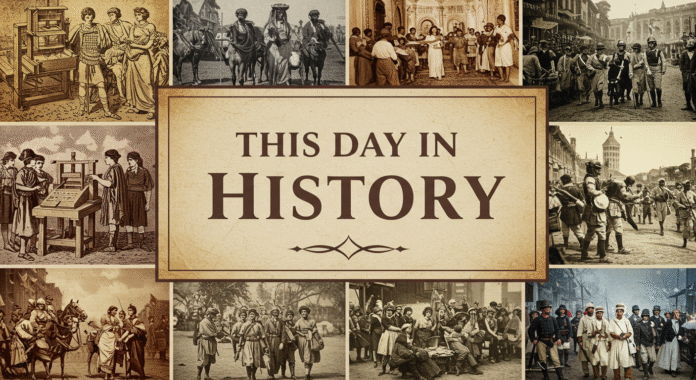1. 1804 – Alexander Hamilton Fatally Wounded in Duel with Aaron Burr
On the morning of July 11, 1804, Alexander Hamilton, former Secretary of the Treasury and one of the Founding Fathers of the United States, was mortally wounded in a duel with Vice President Aaron Burr in Weehawken, New Jersey. The duel was the result of a long-standing political and personal rivalry. Hamilton had publicly criticized Burr, who saw his honor and career endangered. Though Hamilton reportedly fired his pistol into the air, Burr aimed to kill and struck Hamilton in the lower abdomen. Hamilton died the next day.
Significance:
This event eliminated one of the most influential architects of the American financial system and effectively ended Burr’s political career. It also marked the tragic consequences of honor culture in early American politics.
Interesting Fact:
Duels were technically illegal in both New York and New Jersey, but New Jersey was more lenient, which is why they crossed the river to duel.
2. 1914 – Babe Ruth Makes His Major League Debut
On July 11, 1914, George Herman “Babe” Ruth made his Major League Baseball debut as a pitcher for the Boston Red Sox against the Cleveland Naps. At just 19 years old, Ruth pitched seven innings and gave up only three runs in a 4–3 victory. Though he began his career on the mound, Ruth would soon become more famous for his hitting, changing the game of baseball forever.
Significance:
Ruth’s debut marked the arrival of one of the most legendary sports figures in American history. He would later revolutionize baseball with his unprecedented power hitting.
Interesting Fact:
Ruth hit his first career home run a year later in 1915 and went on to hit 714 in total—a record that stood until 1974.
3. 1979 – Skylab Falls to Earth
NASA’s first space station, Skylab, reentered Earth’s atmosphere and disintegrated on July 11, 1979. Launched in 1973, Skylab was abandoned after several manned missions due to budget cuts and shifting priorities. As the orbit decayed, it was expected to burn up mostly over the ocean, but debris scattered over Western Australia.
Significance:
The incident highlighted the need for better control over deorbiting large objects and sparked global discussions on space junk and satellite safety.
Interesting Fact:
A town in Australia fined NASA $400 for littering—though the fine was never paid.
4. 1995 – Srebrenica Massacre Begins
On July 11, 1995, during the Bosnian War, Bosnian Serb forces captured the town of Srebrenica, a UN-designated “safe area.” Over the next few days, more than 8,000 Bosniak Muslim men and boys were systematically executed in what became the worst massacre in Europe since World War II.
Significance:
This atrocity was later ruled a genocide by international courts and led to intensified efforts by NATO to intervene in the Balkans. It also reshaped global understanding of peacekeeping responsibilities.
Interesting Fact:
The failure of UN peacekeepers to protect Srebrenica remains a deeply controversial topic in international relations and UN reform discussions.
5. 2006 – Mumbai Train Bombings Kill Over 200
On July 11, 2006, seven bombs exploded in rapid succession on Mumbai’s suburban train system during the evening rush hour. The coordinated attack killed 209 people and injured over 700. Authorities blamed a Pakistan-based militant group, and the attacks intensified Indo-Pakistani tensions.
Significance:
This act of terrorism exposed vulnerabilities in public transportation and prompted massive security overhauls in India’s metropolitan areas.
Interesting Fact:
Despite the chaos, Mumbai’s train services resumed the very next morning, a testament to the city’s resilience and spirit.



